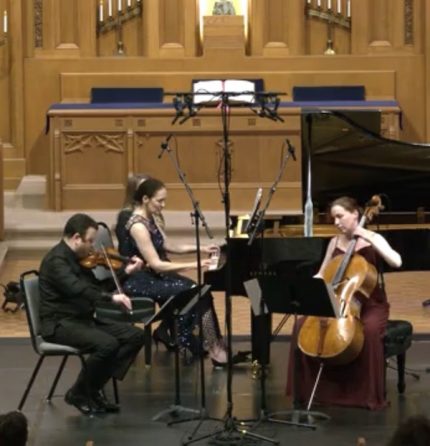North Shore Chamber Fest closes with brilliance and sensitivity

The reopening of Illinois on Friday came at the midpoint of this year’s North Shore Chamber Music Festival in Northbrook. Following the guidelines of its venue, Village Presbyterian Church, masks were optional and no social distancing limits observed for all three festival concerts this week–a welcome relief for both the audience and the musicians who have all been impatiently awaiting the return of concert-hall normality.
Still, the festival had to deal with more than the usual backstage drama. One musician’s absence for “bureaucratic” reasons meant the jettisoning of Saint-Saëns’ Bassoon Sonata from Friday night’s program. Due to an injury, cellist Wendy Warner was only able to perform in one of two pieces Saturday. And violinist Lisa Shihoten’s sudden illness left two of the three scheduled works on the final program short of players. Fortunately, Danbi Um was able to take her place, flying in from New York on Friday, rehearsing and taking the stage with her colleagues.
Despite all the switches and last-minute subbing, Saturday night’s NSCMF concert went off without a hitch at Village Presbyterian Church, which is a testament to executive director Angela Yoffe and the talent and flexible professionalism of all involved.
The program for this final concert also marked a nice coming full circle. The festival opened with Haydn’s Piano Trio No. 39 in G major, which is the first work performed at the benefit concert on the same stage that launched the festival 11 years ago. And the same musicians—violinist Vadim Gluzman, cellist Wendy Warner and pianist Angela Yoffe—reprised that event Saturday night.
The Trio in G major is one of the most programmed of the prolific Haydn’s 45 works in the genre and this performance brought out its winning qualities delightfully. Yoffe was especially idiomatic throughout, with nimble keyboard work that consistently brought out Haydn’s gracious lyricism as well as the light-fingered brilliance. In the opening Andante Gluzman nicely underlined the mock-drama of the minor-key variations. The Rondo a l’Ongarese Presto that gives the work its “Gypsy” nickname is one of Haydn’s finest chamber finales and all three musicians put across the whirlwind ebullience and good humor at a crackling tempo.
In addition to the polished and superb playing, the North Shore Chamber Music Festival always manages to find a graceful programming balance, with neglected curios nestled amid the cornerstones. Such was the case again with the evening’s centerpiece, the Sextet by Ernst von Dohnányi.
Dohnányi wrote his Sextet in 1935 at a time of convalescence from illness. The offbeat mixed forces called for (string trio, clarinet, horn and piano) have likely kept this work from being programmed and heard more often by audiences.
As shown by this dedicated performance, the Hungarian composer’s Sextet has much to offer. The brooding, rhapsodic score is laid out with consummate skill for all six instruments in four movements that mix dark-hued lyricism with surging impassioned sections, the music at times suggesting Brahms, Liszt and even Mahler (in the horn part). The bustling finale is worthy of Haydn in its speed and infectious wit.
All the musicians took their parts with equal polish and commitment, including violinist Danbi Um, violist Rose Armbrust Griffin and pianist Janice Carissa. Cellist Mark Kosower (principal of the Cleveland Orchestra) provided a rock-solid anchor at the low end for the restless bass line. Clarinetist Ilya Shterenberg brought big personality and panache to every solo moment. Hornist Eric Reed, especially, was masterful—polished, characterful and atmospheric as required while always ensuring his instrument was carefully balanced with his colleagues.
Music of Brahms has remained a successful touchstone throughout the past decade of the festival. The final concert of the inaugural season ended with Brahms Piano Quintet in F minor and that same work closed out Saturday’s concert and this year’s festival.
As led by violinist (and artistic director) Gluzman there is always ample fire and brilliance on display in this series. That was surely the case with the Scherzo, as the shadowy theme morphs into emphatic march-like swagger, as well as the finale which was thrilling in the ratcheting up of tension and excitement, driven by Gluzman and festival keyboard stalwart, William Wolfram.
But most striking about this Brahms Quintet was the restraint of so much of the playing. That was apparent in lyrical passages of the opening movement and the Andante particularly. The limpid main theme and gentle melancholy reflection was rendered with the greatest poise and sensitivity by violinists Gluzman and Um, violist Paul Neubauer, cellist Kosower and Wolfram.
Posted in Performances

